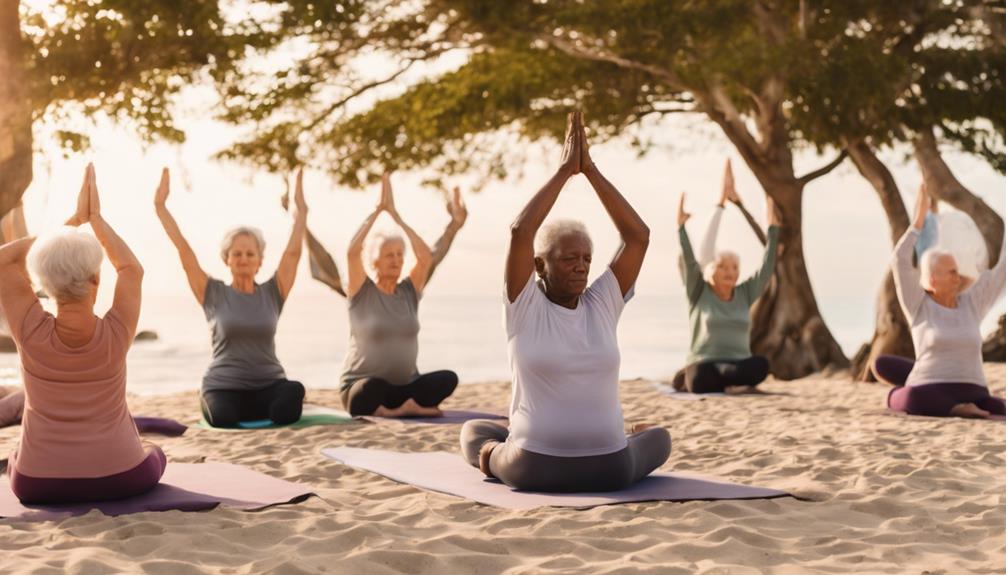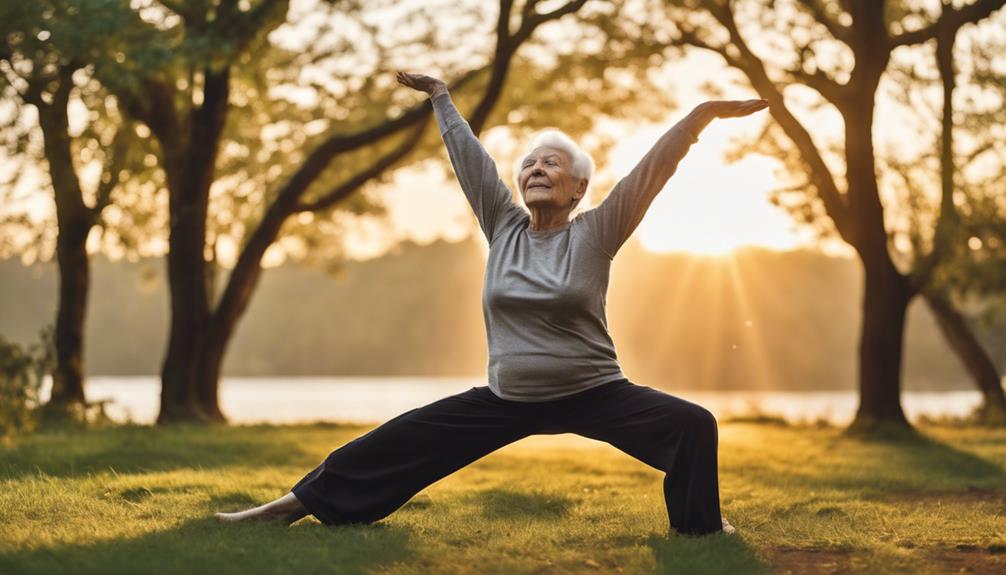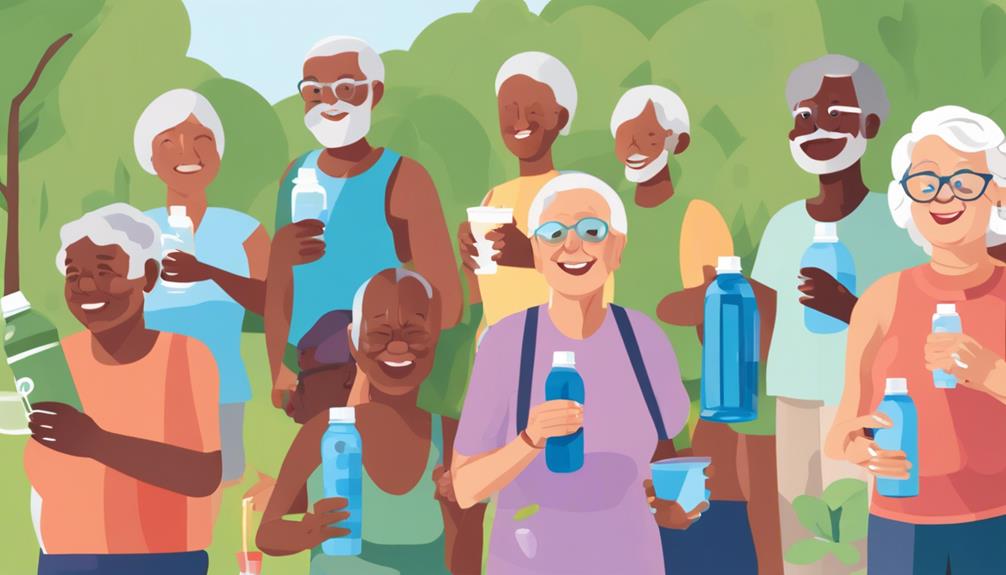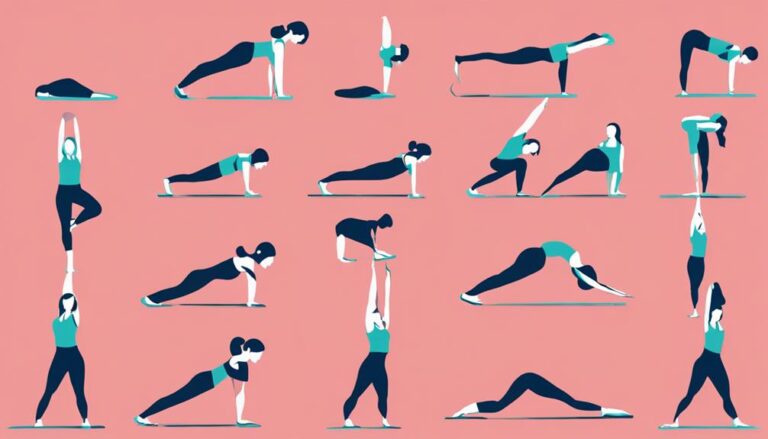Daily Practices for Healthy Aging
Imagine your body as a well-tended garden; just as regular care and attention yield vibrant blooms and flourishing greenery, nurturing your physical and mental well-being through daily practices can cultivate a fulfilling and healthy aging process. From the food you consume to the movements you engage in, every choice you make impacts the landscape of your future self. So, how can you ensure your garden thrives with vitality and resilience as the seasons change?
Key Takeaways
- Engage in regular physical activity like gentle stretching or yoga.
- Maintain a nutritious diet with superfoods for longevity.
- Stay hydrated with water and fruit-infused drinks.
- Prioritize quality sleep with a consistent routine.
- Manage stress through mindfulness and relaxation techniques.
Physical Activity
Getting older doesn't mean you have to slow down. In fact, staying physically active is crucial for maintaining your overall health and well-being as you age. Engaging in safe exercises that focus on mobility can help you feel stronger, more energized, and better equipped to tackle daily tasks.
To keep moving comfortably and confidently, consider incorporating mobility exercises into your routine. These exercises can help improve flexibility, balance, and coordination, reducing the risk of falls and enhancing your quality of life.
Simple activities like gentle stretching, yoga, or tai chi can work wonders for keeping your body agile and resilient.
Nutritious Diet
Maintaining a nutritious diet is a foundational aspect of healthy aging, providing your body with the essential nutrients it needs to function optimally. Including superfoods for longevity in your meals can significantly boost your health. Consider incorporating nutrient-rich options like berries, fatty fish, nuts, and leafy greens into your daily meals. These foods are packed with antioxidants, omega-3 fatty acids, and vitamins that support overall well-being and promote longevity.
Meal planning strategies are key to ensuring you eat balanced and nutritious meals regularly. Start by creating a weekly meal plan that includes a variety of fruits, vegetables, lean proteins, whole grains, and healthy fats. This approach can help you avoid impulsive food choices and ensure you're getting all the necessary nutrients your body requires.
Additionally, preparing meals in advance or batch cooking can save time and make it easier to stick to your healthy eating goals. Remember, a well-rounded and nourishing diet is a powerful tool in your journey towards healthy aging.
Hydration
Now that you've laid a strong foundation with a nutritious diet, let's turn our focus to the often overlooked yet vital aspect of hydration. Proper hydration is key to healthy aging, affecting everything from your energy levels to your skin's radiance. Here are three essential points to keep in mind:
- Water Intake: Remember to sip water throughout the day, not just when you feel thirsty. Dehydration can sneak up on you, so keep a water bottle handy to ensure you're meeting your daily intake needs.
- Hydration Benefits: Hydrating adequately can improve cognitive function, enhance digestion, and boost your overall mood. Stay hydrated to support your body in functioning optimally as you age.
- Hydration Rituals: Create rituals around drinking water, like starting your day with a glass of water or infusing it with fresh fruits for added flavor. Making hydration a mindful practice can help you stay consistently hydrated and healthy.
Quality Sleep
Ensuring a good night's rest is essential for your overall well-being and healthy aging journey. Quality sleep plays a vital role in maintaining cognitive function, emotional well-being, and physical health as you age. By incorporating effective sleep hygiene practices and relaxation techniques into your nightly routine, you can improve the quality of your sleep and enhance your overall quality of life.
| Sleep Hygiene | Relaxation Techniques |
|---|---|
| Maintain a consistent sleep schedule | Practice deep breathing exercises |
| Create a relaxing bedtime routine | Try progressive muscle relaxation |
| Keep your bedroom cool, dark, and quiet | Listen to calming music before bed |
| Limit screen time before bedtime | Take a warm bath or shower |
| Avoid heavy meals and caffeine close to bedtime | Engage in gentle yoga stretches |
If you find yourself struggling with sleep disorders or want to track your sleep patterns, consider consulting with a healthcare provider or using sleep tracking devices to gain insights and improve your sleep quality. Remember, prioritizing quality sleep is a valuable investment in your health and aging process.
Stress Management
Prioritizing effective stress management techniques is crucial for promoting overall well-being and healthy aging. As you journey through the process of aging, managing stress becomes increasingly important for your physical and mental health. Here are some practical ways to incorporate stress management into your daily routine:
- Meditation Techniques: Take a few minutes each day to practice mindfulness meditation. Focus on the present moment, let go of worries, and breathe deeply to center yourself.
- Breathing Exercises: Engage in deep breathing exercises to calm your mind and body. Try inhaling deeply through your nose, holding for a few seconds, and then exhaling slowly through your mouth.
- Nature Walks: Spend time outdoors connecting with nature. The fresh air, green surroundings, and gentle exercise can help reduce stress levels and promote a sense of calmness.
Social Connections
Building and maintaining strong social connections is a vital component of healthy aging. Community involvement can provide a sense of belonging and purpose, fostering emotional support that's essential for overall well-being. Engaging in activities within your community not only keeps you connected but also allows you to contribute positively to the world around you.
Nurturing friendship circles is equally important. Surrounding yourself with individuals who uplift and support you can have a profound impact on your mental and emotional health. Make time for social events, gatherings, or even virtual meetups to stay connected with friends and loved ones. These interactions offer opportunities for laughter, sharing experiences, and creating lasting memories.
Mental Stimulation
To keep your mind sharp and engaged as you age, it's essential to actively seek out mental stimulation. Engaging in cognitive exercises and memory games can help keep your brain agile and improve your memory retention. Here are three ways to incorporate mental stimulation into your daily routine:
- Challenge Your Brain: Dedicate time each day to solve puzzles, crosswords, or Sudoku. Engaging in these activities can help maintain cognitive function and boost mental acuity.
- Explore Creative Hobbies: Engaging in creative hobbies such as painting, writing, or crafting can stimulate your brain in new and exciting ways. These activities not only provide mental stimulation but also offer a sense of accomplishment and fulfillment.
- Pursue Intellectual Interests: Cultivate your intellectual curiosity by reading books, attending lectures, or taking up a new skill or hobby. Engaging in intellectual pursuits can broaden your knowledge base and keep your mind active and sharp as you age.
Regular Health Check-ups
Maintaining your overall well-being and staying on top of your health as you age involves more than just mental stimulation. Regular health check-ups are key to ensuring you're proactive about your health. Preventative care and early detection are crucial in catching any potential health issues before they escalate. By scheduling medical screenings and health monitoring appointments, you can stay informed about your body's current state and take necessary actions to maintain your well-being.
These check-ups provide an opportunity for your healthcare provider to assess your overall health, discuss any concerns you may have, and recommend appropriate lifestyle changes or treatments. They can help detect conditions in their early stages when they're most treatable. Remember, prevention is always better than cure.
Sun Protection
Ensuring adequate sun protection is essential for maintaining healthy skin and reducing the risk of skin damage as you age. The sun's UV rays can be harsh on your skin, leading to premature aging and increasing the chances of skin cancer. Here are some practical tips to protect your skin and keep it looking youthful:
- Sunscreen Application: Apply a broad-spectrum sunscreen with an SPF of 30 or higher every day, even on cloudy days. Reapply every two hours, especially if you're outdoors.
- Hat Wearing: Invest in a wide-brimmed hat to shield your face, neck, and ears from direct sunlight. This simple accessory can go a long way in preventing sun damage and reducing the risk of skin cancer.
- Skin Protection: Wear protective clothing, like long sleeves and pants, when spending extended periods under the sun. This extra layer of defense can help limit UV exposure and maintain your skin's health for years to come.
Proper Posture
Protecting your skin from the sun is vital for healthy aging, and another aspect that's often overlooked is the significance of maintaining proper posture. Good posture not only contributes to a more confident appearance but also plays a crucial role in your overall health and well-being as you age.
To support proper posture, consider investing in ergonomic furniture that promotes alignment and supports your spine. These pieces are designed to reduce strain on your body, especially during long periods of sitting.
Regular chiropractic care can also be beneficial in maintaining proper spinal alignment and addressing any postural issues. A chiropractor can provide adjustments and exercises tailored to improve your posture and alleviate any discomfort you may be experiencing.
Gratitude Practice
To cultivate a positive outlook and enhance your well-being as you age, incorporating a daily gratitude practice into your routine can be immensely beneficial. Taking time for daily reflection and acknowledging the things you're grateful for can have a profound impact on your overall happiness and mindset. Consider starting a gratitude journal to document your thoughts and experiences, allowing you to revisit them whenever you need a boost.
Here are three ways a gratitude practice can enrich your life:
- Increased Positivity: By focusing on the good in your life, you can shift your perspective from what you lack to what you have, fostering a sense of contentment.
- Stress Reduction: Expressing gratitude can help lower stress levels and promote relaxation, leading to improved mental and physical well-being.
- Enhanced Relationships: Practicing gratitude can strengthen relationships by encouraging appreciation and empathy, creating deeper connections with those around you.
Embrace the power of gratitude in your daily routine to nurture a more fulfilling and joyful life.
Time in Nature
Spending time in nature can be a rejuvenating and grounding experience, offering numerous benefits for your physical and mental well-being. Engaging in activities like forest bathing or outdoor exercise can boost your immune system, lower stress levels, and improve your mood. Nature walks provide an opportunity to connect with the world around you, allowing you to slow down and appreciate the beauty of your surroundings.
Mindfulness practice in nature can help you cultivate a sense of presence and gratitude. Take a moment to listen to the sounds of the birds chirping or feel the gentle breeze on your face. Allow yourself to be fully immersed in the sights, smells, and sensations of the natural world. This can help reduce anxiety, increase your sense of well-being, and enhance your overall quality of life.
Make it a habit to spend time outdoors regularly, whether it's a short walk in the park or a weekend hike in the mountains. The benefits of connecting with nature are profound and can have a lasting impact on your health and happiness.
Frequently Asked Questions
Can Meditation Improve Cognitive Function in Older Adults?
Yes, meditation, especially mindfulness practices, can indeed improve cognitive function in older adults. Engaging in regular meditation can positively impact brain health by enhancing focus, memory, and overall mental clarity. It's a beneficial practice for healthy aging.
How Does Volunteering Benefit Healthy Aging?
Volunteering can deeply benefit healthy aging by fostering social connections and enhancing community engagement. Through helping others, you'll find purpose, combat isolation, and boost mental well-being. Embrace the opportunity to give back and thrive.
Is Laughter Important for Overall Well-Being as We Age?
Laughter therapy and humor workshops are crucial for your overall well-being as you age. They boost mood, reduce stress, and enhance social connections. Make time for laughter daily to nurture your mind, body, and soul.
What Role Does Creativity Play in Healthy Aging?
Creativity, through art therapy and mindful expression, nurtures your soul as you age. Engaging in creative pursuits enhances cognitive function, emotional well-being, and overall quality of life. Let your imagination flourish for a vibrant and fulfilling journey ahead.
Can Music Therapy Help With Memory and Mood in Older Individuals?
Hey there! Music therapy benefits you by enhancing memory and mood. It's a wonderful tool for improving memory recall and lifting your spirits. Give it a try for a boost in mental wellness.
Conclusion
As you continue to embrace these daily practices for healthy aging, remember that you are planting seeds for a vibrant future garden of wellness. Each stretch, each bite of nourishing food, each sip of water, and each moment of rest is like a drop of sunshine feeding your soul's garden. Cultivate your well-being with care and intention, and watch as the blossoms of vitality and joy bloom within you. Your future self will thank you for the love you are nurturing today.















